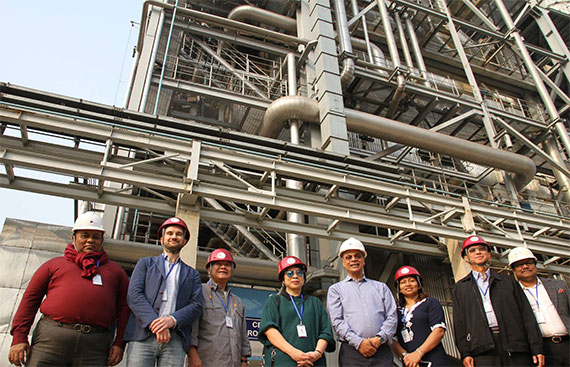Summit Group's Tower Acquisition From Banglalink Strengthens Telecom Infrastructure

Summit Group, Bangladesh's largest infrastructure conglomerate, significantly expanded its telecommunications footprint with the acquisition of over 2,000 telecom towers from Banglalink, one of the country's major mobile operators. Completed in 2023 and valued at approximately $100 million, this acquisition has positioned Summit Towers Ltd as a major player in Bangladesh's telecommunications infrastructure market and aligns with the country's broader digital transformation goals.
Ownership of 2,012 telecommunications towers transferred from Banglalink to Summit Towers Ltd, with Banglalink entering into a 12-year leaseback agreement to continue using the infrastructure.
"This strategic deal is a prelude to greater cooperation between Banglalink and Summit, the largest integrated telecommunications infrastructure company in Bangladesh," said Muhammad Farid Khan, chairman of Summit Communications Limited and Summit Towers Limited.
"The future is ours to grow together. With support from [Bangalink parent company] Veon, we believe that our collaboration will go beyond the boundaries of Bangladesh into the global arena, setting an example in the region."
For Banglalink, the transaction allows the company to focus on its core services.
"Our partnership with Summit Towers enables us to focus our resources on our digital offerings, bridging the digital divide for all and providing an outstanding customer experience to the people of Bangladesh," said Erik Aas, CEO of Banglalink.
Part of a broader trend in Bangladesh's telecommunications industry toward infrastructure sharing, this acquisition promotes efficiency and allows operators to concentrate on service delivery rather than infrastructure management. Such approaches align with the country's directive for optimized resource utilization in the telecommunications sector.
Current State of Telecommunications in Bangladesh
Bangladesh's telecommunications sector is experiencing notable growth, significantly contributing to the nation's economic development and digital transformation. Market projections indicate a value of $5.08 billion by 2025, with an anticipated compound annual growth rate of 4.31%, aiming for $6.27 billion by 2030.
Introduction of the National Broadband Policy 2023 by the Bangladesh Telecommunication Regulatory Commission aims to establish universal access to high-capacity broadband services.
Nationwide 4G coverage now reaches 100%, complemented by 99.57% coverage for 3G services, leading to an internet penetration rate of 52.84%. By 2024, Bangladesh reached 188.6 million mobile subscriptions, exceeding the nation's population, alongside internet connectivity in 22.27 million households.
Future projections indicate steady annual growth in fixed broadband subscriptions (9.3%) and internet user penetration (12%) from 2024 through 2031, illustrating a major shift toward digital technology adoption. Driven primarily by data usage rather than traditional voice and SMS services, enhanced infrastructure supports a thriving market of 52.9 million social media users, improving economic opportunities, connectivity, and social interactions across urban areas.
Public-private partnerships have played a key role in this progress, with active encouragement for telecom operators' substantial investments to expand and enhance high-speed internet access and reliable mobile networks for urban residents.
Industry Implications of the Acquisition
Valued at $100 million, this acquisition underscores a fundamental reconfiguration of telecommunications infrastructure management in Bangladesh. Summit's expanded tower portfolio — now exceeding 4,000 towers nationwide — establishes it as a prominent infrastructure provider in Bangladesh. Summit now operates the third most towers in the country, behind integrated telecommunications infrastructure services company Edotco Group's roughly 15,950 towers and Grameenphone's 12,500 towers.
"This, coupled with a fiber optic network spanning over 55,000 km and the upcoming submarine cable, will position Summit Communications Group as the country's primary end-to-end digital infrastructure provider," said Muhammad Farid Khan during the official deal closure announcement.
Essential infrastructure consolidation principles now driving telecommunications evolution globally are reflected in this transaction. Bangladesh Telecommunication Regulatory Commission's tower sharing guidelines have established a framework that encourages specialized infrastructure providers to emerge, allowing mobile network operators to focus on service innovation rather than physical asset management.
Separation of infrastructure from service delivery mirrors industry transformations occurring across developing telecommunications markets, where infrastructure sharing models deliver operational efficiencies, accelerate network expansion, and create specialized expertise domains.
A 12-year leaseback agreement between Summit Group and Banglalink establishes a sustainable, symbiotic relationship that exemplifies how traditional competitive boundaries are being redrawn in favor of collaborative approaches to infrastructure development. Such reconfiguration allows both entities to focus on their respective core competencies while maximizing asset utilization across the entire telecommunications ecosystem.
Technological Integration and Future Network Capabilities
Marking a significant milestone in Summit Group's evolution toward becoming an integrated telecommunications infrastructure provider, this tower acquisition presents Summit with the complex task of integrating these towers into its existing operations while developing an ecosystem that maximizes their value.
Summit must harmonize disparate monitoring systems, maintenance schedules, and operational protocols across its expanded tower portfolio. Integration processes require sophisticated asset management frameworks that enable unified oversight while accommodating location-specific variables across Bangladesh's diverse geographical contexts.
An expanded infrastructure footprint creates multidimensional capabilities that extend beyond traditional tower functionality. Summit's control of both fiber optic networks and tower infrastructure should enable development of adaptive network architectures that respond more effectively to evolving bandwidth demands and emerging use cases.
Enhanced capacity positions Summit Group for Bangladesh's impending 5G implementation. At a celebration event for the acquisition in February 2024, company representatives highlighted how the expanded tower network would contribute to "preparing for the impending 5G revolution.”
From a technological perspective, combining Summit's extensive fiber network with its expanded tower portfolio creates a foundation for advanced network architectures that Bangladesh will require as data demands accelerate. Summit's fiber optic network — spanning approximately 55,000 kilometers — provides critical backhaul capacity essential for managing the data volumes that 5G networks will generate.
Reshaping Digital Infrastructure in Bangladesh
Beyond immediate business implications, Bangladesh's telecommunications infrastructure ecosystem is restructured by this acquisition in ways that may accelerate digital transformation across multiple sectors.
At the celebration event, Arif Al Islam, managing director and CEO of Summit Communications Limited and Summit Towers Limited, emphasized the historical significance of the transaction: "This is the first acquisition of a tower in the telecom industry in Bangladesh and sets precedence for more of such transactions.”
Within the broader context of Bangladesh's digital transformation, infrastructure investments like this acquisition can catalyze technological advancement while addressing persistent challenges of connectivity, affordability, and service quality that remain critical to achieving inclusive digital growth.
Read More News :
5 Things to Know About Loans Against Mutual Fund Investments
Mohini Mohan Dutta Gives Consent to Ratan Tata's Will, Inherits Rs 588 Crore Share



